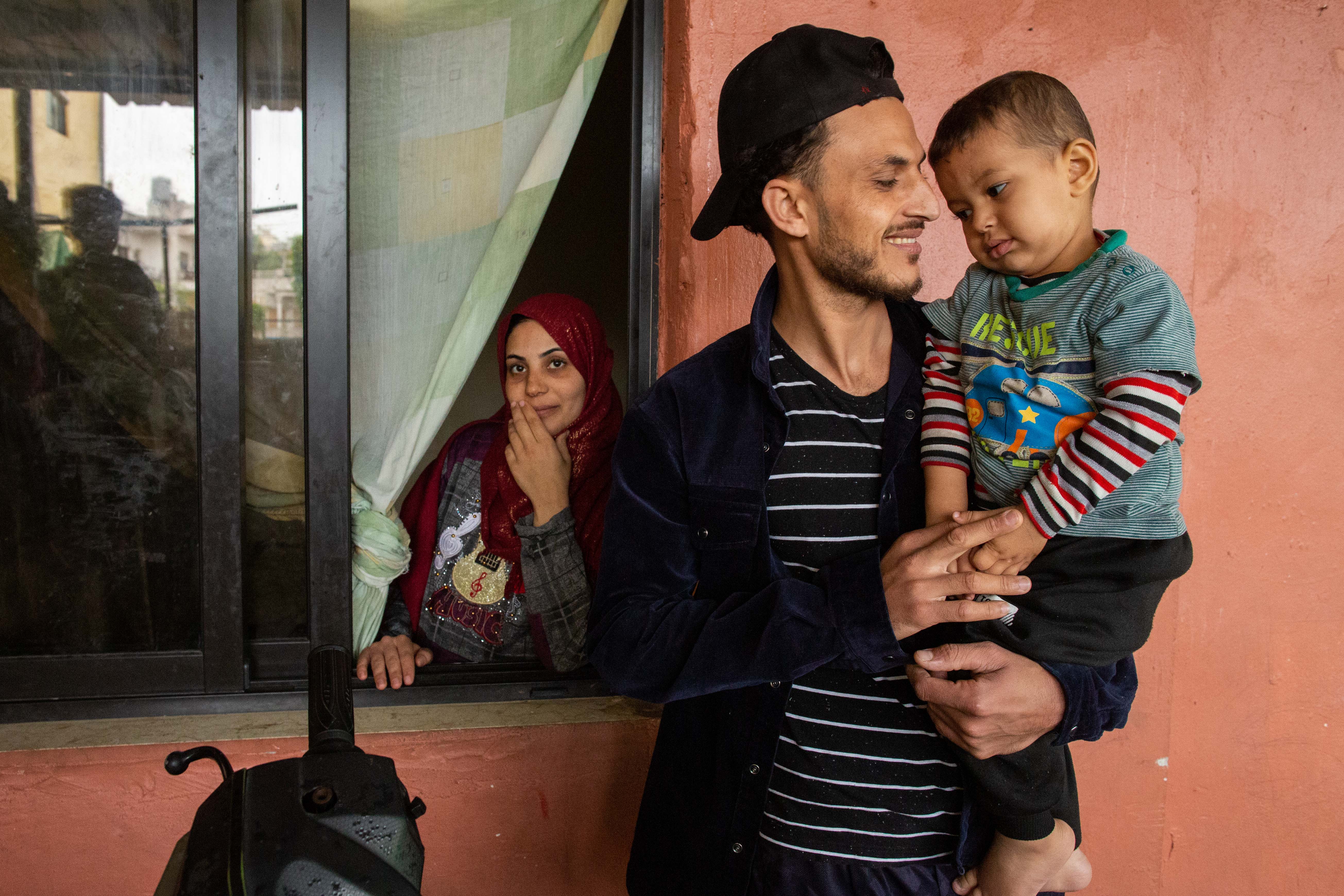Slideshow
How PROSPECTS Partnership helps build resilience of hosts and refugees communities in Lebanon
Despite facing one of the worst socio-economic crisis in decades, Lebanon continues to host one of the highest number of refugee populations. The PROSPECTS Partnership supported by the Kingdom of Netherlands is providing education, employment and social protection support to build resilience and self-reliance of both hosts and refugees in the country.

Background
Forced displacement has surged in scale and complexity around the world, becoming increasingly protracted. To rise to the challenge crises response must shift to humanitarian-development approaches, backed by more dignified, inclusive and comprehensive programmes for refugees and the communities that host them.Lebanon is no exception.
The country’s government estimates 1.5 million Syrian refugees residing within its territory, with 90% of them living in extreme poverty. Lebanon, which is hosting the highest number of refugees per capita worldwide, is also facing its worst socioeconomic crisis in decades. The country’s severe and prolonged economic depression is, according to the World Bank, "likely to rank in the top 10, possibly top 3, most severe crisis episodes globally since the mid-nineteenth century."
Forcibly displaced persons face specific vulnerabilities in the country, including psychological trauma, lack of employment opportunities and protection risks. Meanwhile, host communities struggle to pursue their own development efforts in an environment that has been transformed by a large influx of newcomers amid its already endemic challenges.
Robust and effective partnerships in Lebanon that maximize synergies and leverage comparative advantages have become crucial. Self- reliance, empowerment of all people and social cohesion need to be facilitated and strengthened.
With this in mind, the Government of the Netherlands-supported PROSPECTS partnership, comprising of the International Finance Corporation (IFC), the International Labour Organization (ILO), the UN Refugee Agency (UNHCR), the UN Children's Fund (UNICEF) and the World Bank, is jointly acting on multiple fronts across Lebanon.
The partnership aims to reduce vulnerabilities and increasing social stability for refugees and host communities by improving resilience and self-reliance through a joint humanitarian-development approach, focusing on nexuses between access to protection, education and work.
This photo gallery sheds light on a few of the joint activities that the partnership is carrying out in the country, bringing its concerted efforts to the next level of support for the benefit of the Lebanese society as a whole. It is doing so by fostering an enabling environment for socio-economic inclusion, improving access to education and protection for vulnerable people on the move, and eventually strengthening the resilience of the host community.
1. Syrian Fatima Mohammad Kheir Al Zaytoun walks in front of the Community Development Center (CDC) in Akkar, northern Lebanon. Community Centers are public spaces established with the main goal of providing both refugees and Lebanese with a safe space to learn, communicate, share experiences, granting them access to specific care when needed. Standards activities in the CDCs include awareness raising, skills-training, and learning activities.
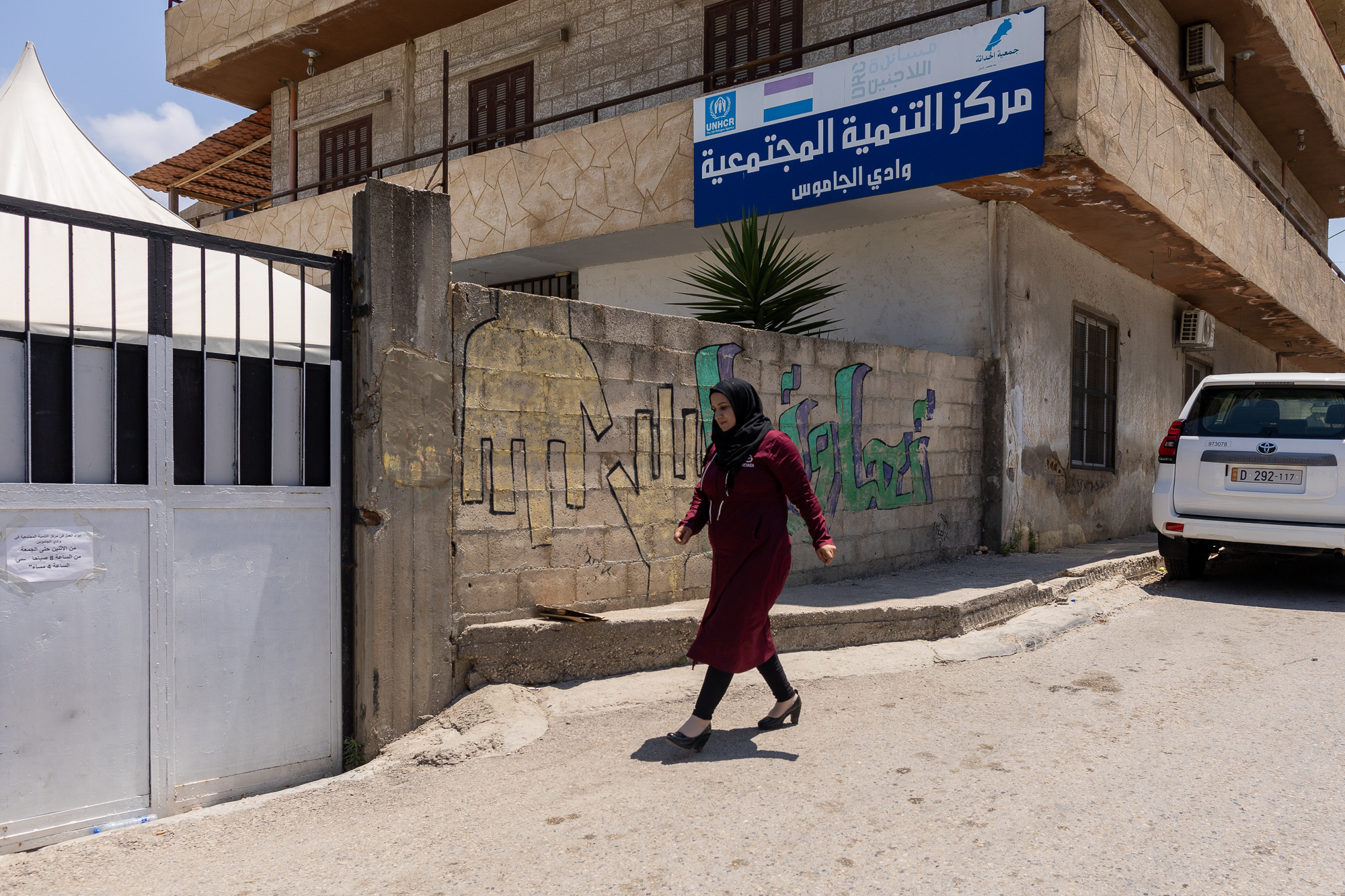
2. Syrian and Lebanese beneficiaries attend a skills-building session in a Community Center (CDC) in Akkar, northern Lebanon. The International Labour Organization (ILO) and the United Nations High Commissioner for Refugees (UNHCR) jointly work here with multiple partners on integrating employability and employment services within the framework of PROSPECTS’s employment pillar. Through this collaboration, the ILO has introduced career development and employment services targeting members of both the refugee and host communities. The two agencies renewed their partnership in early 2022 and are set to expand the integration of career guidance and employment services across three other CDCs in Akkar in the country’s north.
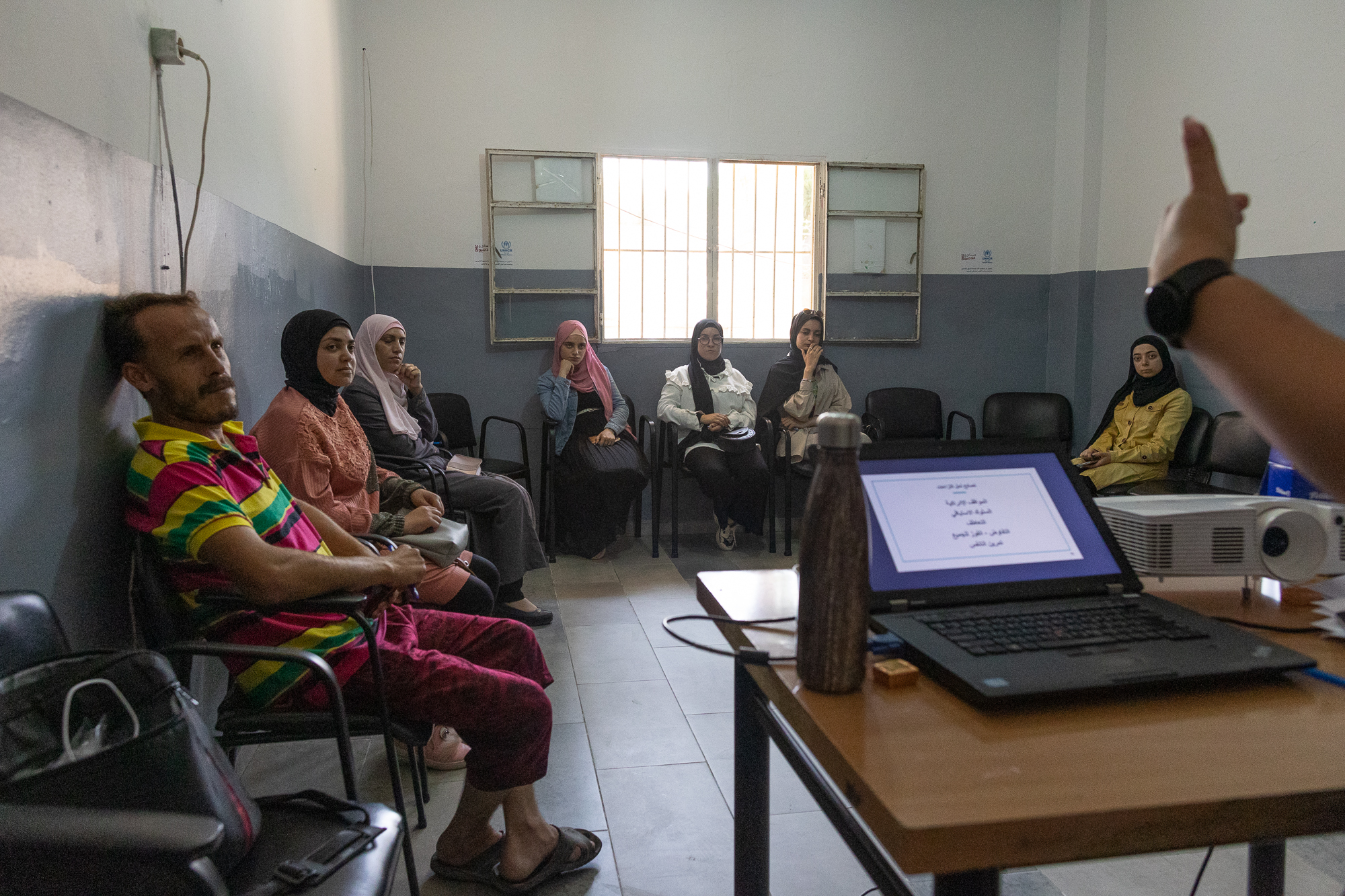
3. A Syrian refugee works on her sewing machine in one of the country’s Community Centers, where she has been receiving training sessions and employment advice for the past years. So far, over 200 beneficiaries have received career counselling as a result of the ILO-UNHCR partnership, and another 120 attended sessions on life skills and decent work. Meanwhile, over thirty beneficiaries have received soft skills training, and around 80 attendees were placed in a three-month on-the-job training experience. Also, around 50 between Syrian refugees and Lebanese were referred to short-term employment opportunities, 15 others to a longer-term job position and over 120 were included in an occupational mapping to be shared with local employers in the country’s north.
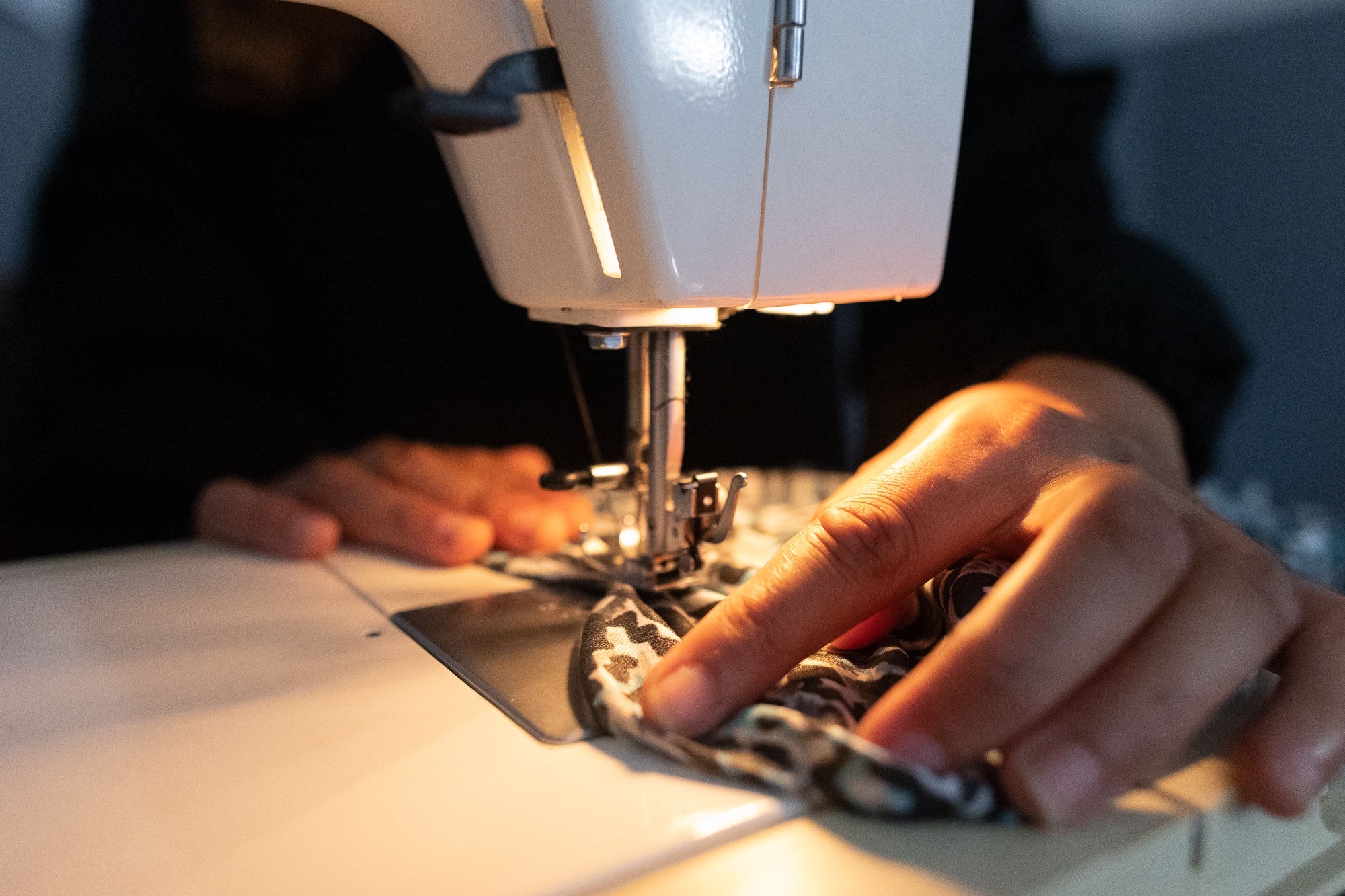
4. Lebanese and Syrian beneficiaries attend a class in a Community Development Centre in northern Lebanon. PROSPECTS-run CDC’s activities supported around 45,000 vulnerable Syrian refugees and Lebanese in five centres across the country throughout 2021. The World Bank supported UNHCR to strengthen social service delivery through the CDCs. Both the UNHCR and World Bank technical teams continue to collaborate and share knowledge on mechanisms related to the delivery and monitoring of cash assistance and social services. The UNHCR’s cash assistance programme for refugees in Lebanon is one of the largest in the world and is implemented in close coordination with UNICEF and the World Food Programme. The financial assistance provided is a lifeline for the families to cover their basic needs like rent, food, and medicines, while also reducing their vulnerability to exploitation and harmful coping strategies. Refugees also contribute to the local economy by purchasing directly from local markets and shops.
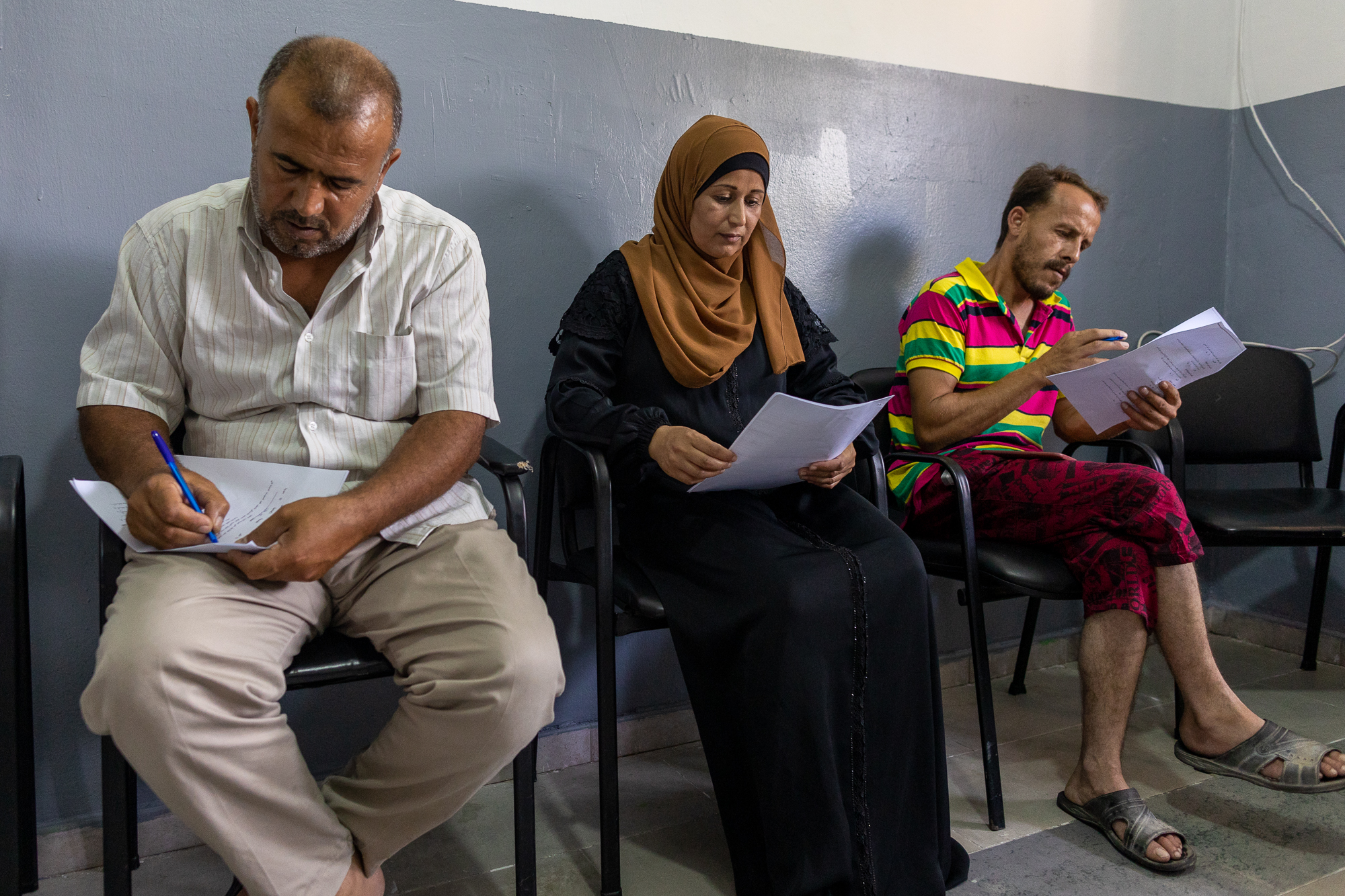
5. Syrian refugee Faiza Saad Al Dine Mando, 42, poses for a picture in Akkar’s Community Development Centre, in northern Lebanon. Al Dine Mando hails from the outskirts of the Syrian city of Homs. She and her family sought refuge in Lebanon in 2014 when heavy shelling started targeting their area. The mother of five says three of her children dropped out of school, still they were currently receiving Psycho-Social Support, English and computer classes in the Community Development Centre. One of her sons is also volunteering in the centre. Al Dine Mando is currently waiting to start English classes in the CDC to support her children in their homework, and to be able to read doctors’ prescriptions. Her family is a recipient of a multi-purpose cash assistance programme, receiving LBP 1,000,000 per month (around 30USD based on the dollar exchange rate on Lebanon’s black market). Between March 2021–February 2022, PROSPECTS funds supported around 40,000 severely vulnerable Syrian refugee families with multi-purpose cash assistance. As the average family size amounts to 4.9 people, some 200,000 severely vulnerable children, women, and men received lifesaving help to cover critical survival needs and boost their resilience.
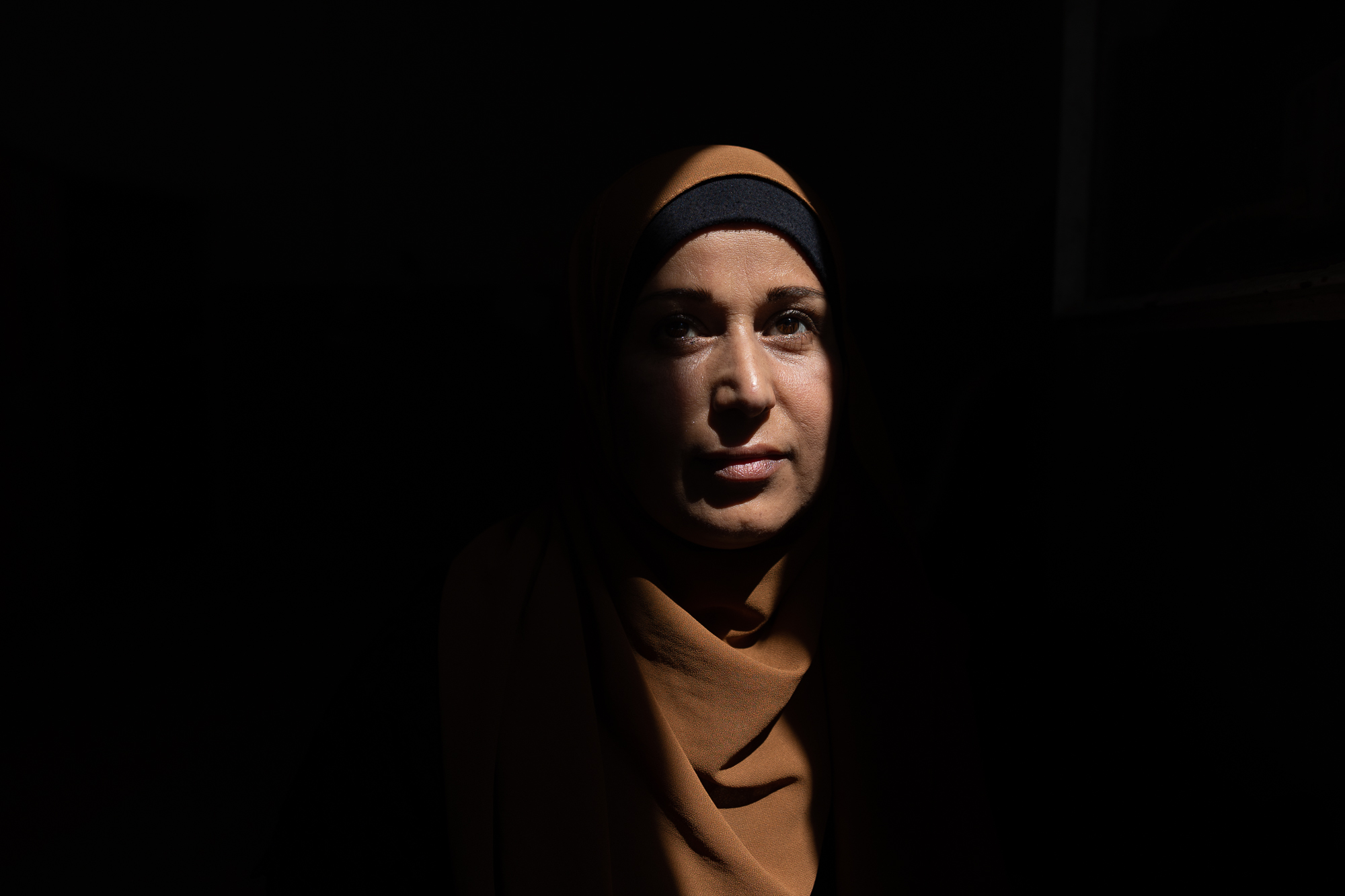
6. Syrian refugees and Lebanese beneficiaries attend a psychosocial support session in one of Lebanon’s CDCs. A joint UNHCR – UNICEF project is set to improve the mental health and psychosocial wellbeing of refugees and vulnerable Lebanese through strengthening of integrated mental health and psychosocial support services. The project started in 2021 with the goal of building community capacities for the deliverance of integrated non-specialized community-based psychosocial support. This will boost the community’s resilience, and will strengthen psychosocial support services through learning, prevention and responses across the country’s Community Development Centers (CDCs).
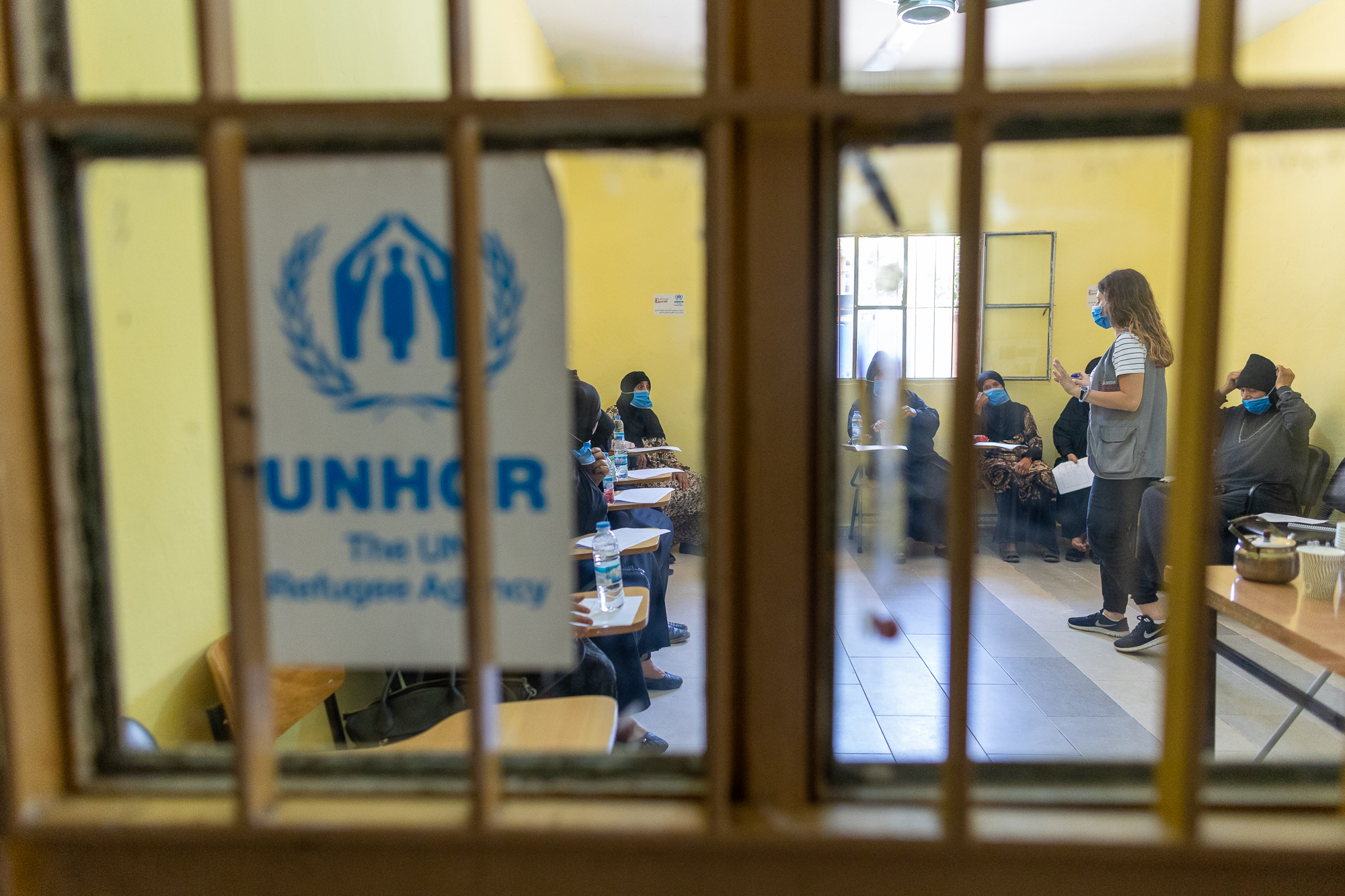
7. Syrian refugee Fatima Mohammad Kheir Al Zaytoun, 30, stands in a cornfield in the farm she works in northern Lebanon. Al Zaytoun hails from Homs, but she fled to Lebanon in 2013 due to the conflict in her home country. She has been living in in an informal settlement in the Lebanon’s north for the past six years. The mother of two is the sole breadwinner in her family, as her husband is suffering from a disease that prevents him from working.
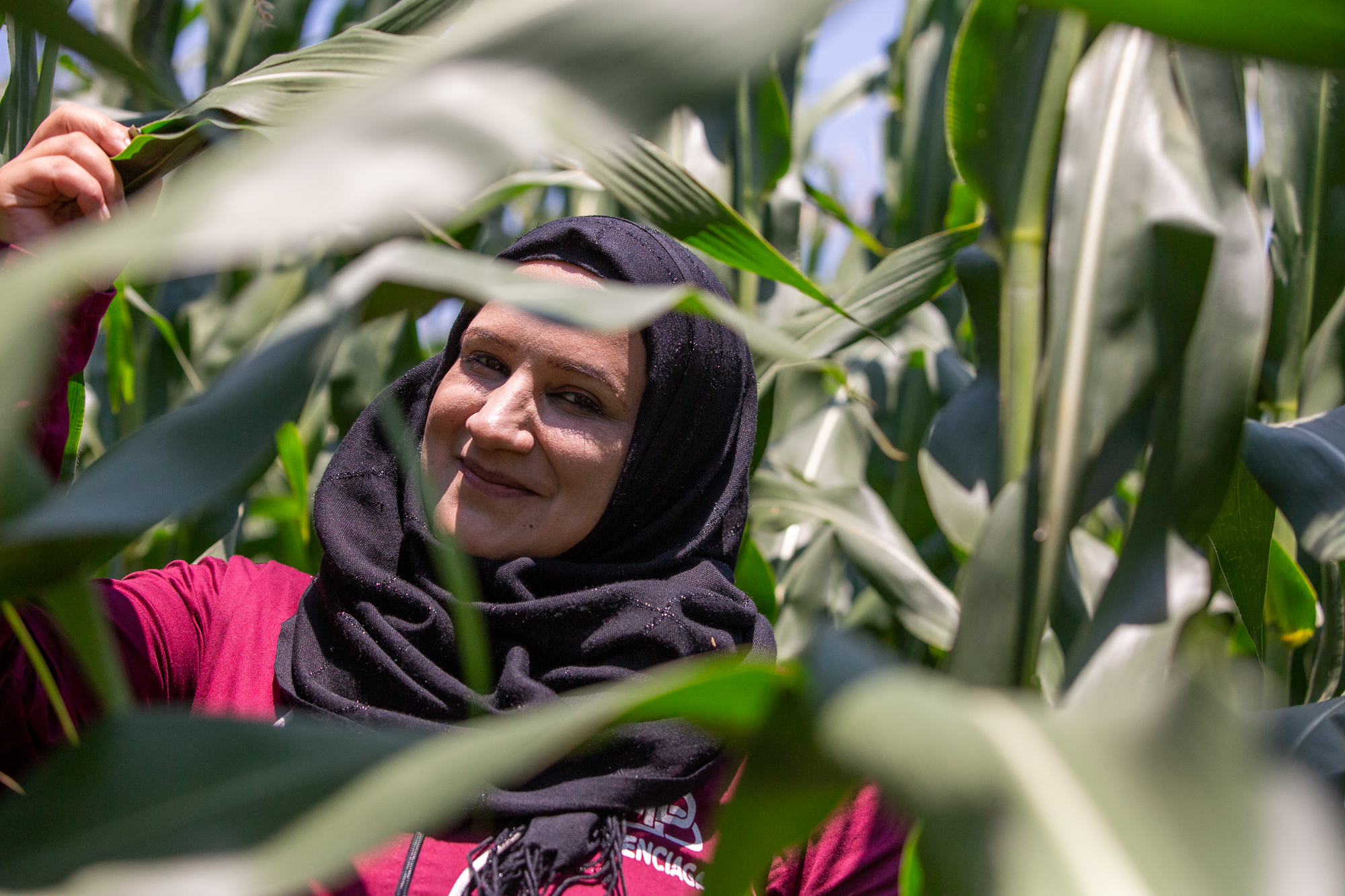
8. Syrian refugee Fatima Mohammad Kheir Al Zaytoun, 30, speaks about possible improvements in her job with the owner of the farm where she is currently working in northern Lebanon. Al Zaytoun attended an ILO-run agriculture training programme in one of the CDCs in the area and has recently started her on-the-job training experience in the farm as part of her course. She says it will greatly help in securing her family’s basic needs.
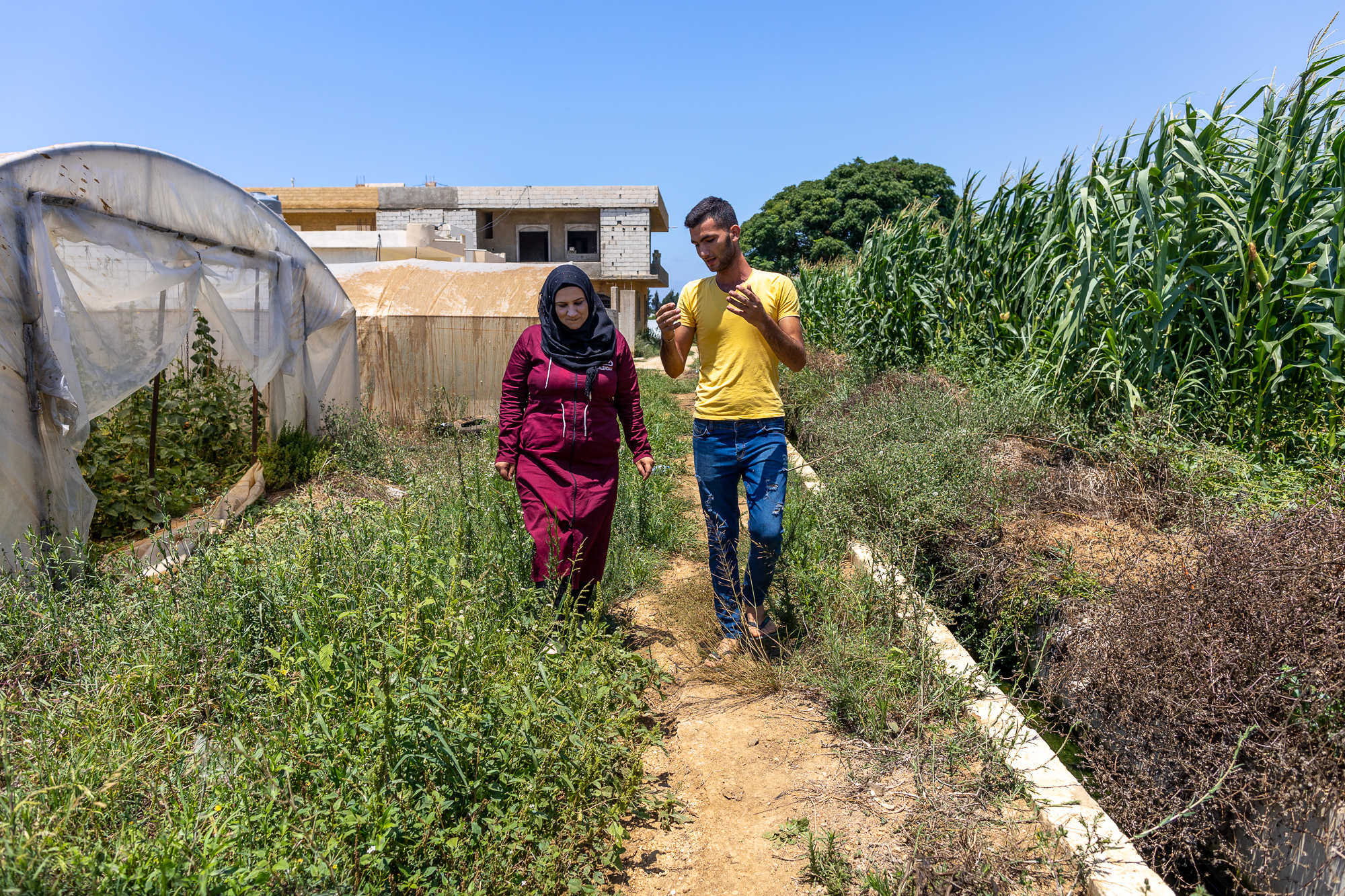
9. Lebanese Boushra Merkbawi, 22, stands against the wall of a Community Development Centre (CDC) in Akkar, in northern Lebanon.
Merkbawi is currently pursuing a degree in business administration in the Lebanese University in Qoubbe – Tripoli. She also joined an accounting course in one of the CDCs in northern Lebanon, supported by the PROSPECTS partnership.
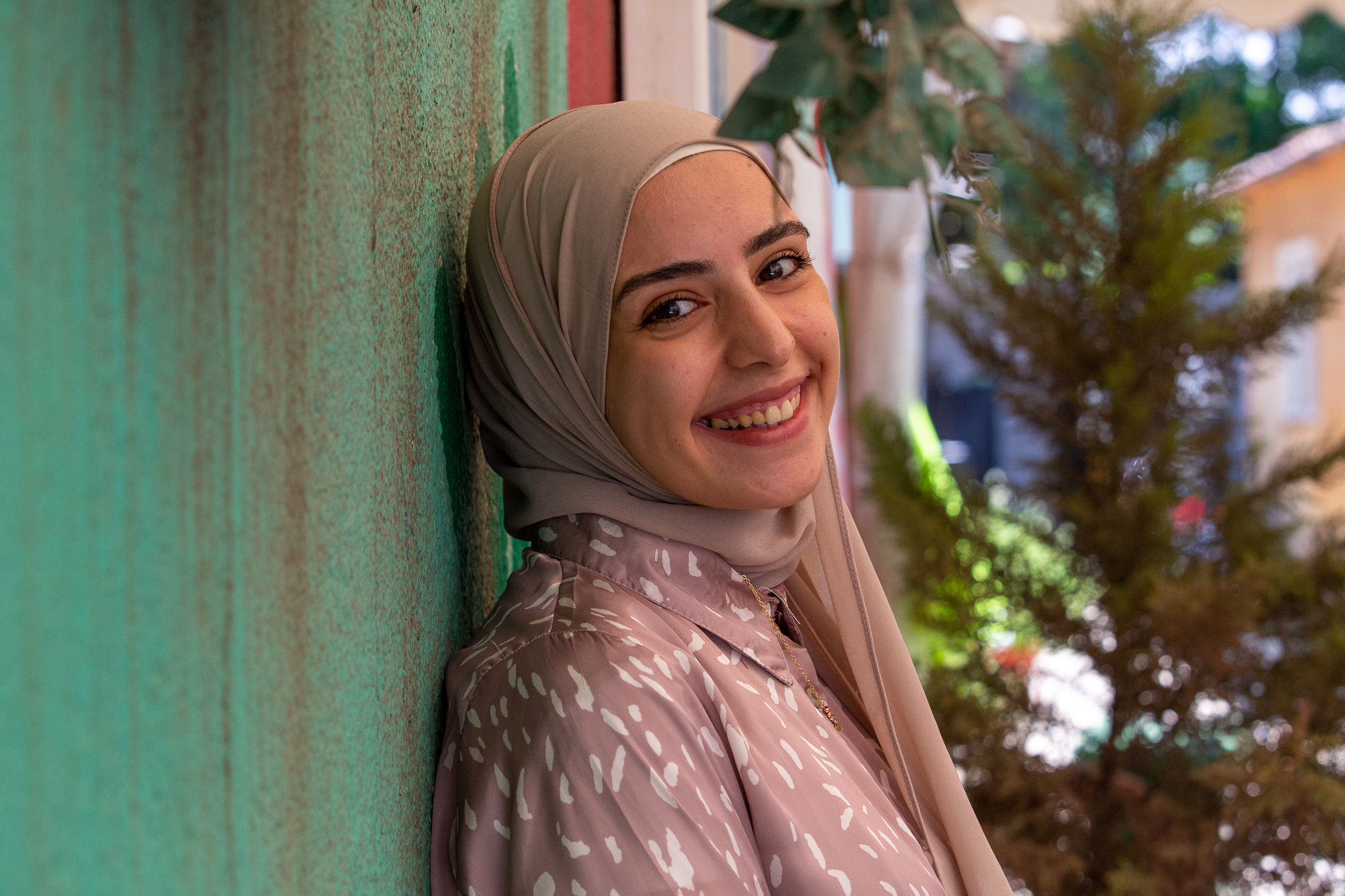
10. Lebanese Boushra Merkbawi, 22, speaks with a receptionist in Al Gamal company for food industry in the outskirts of Akkar, in northern Lebanon. Merkbawi attended several PROSPECTS-run courses in the town’s CDC. One of them is a life skills training programme, which helped her obtain an internship at Al Gamal company for food industry, where she is focusing on accounting services. She says she wanted to pursue a career in the sector and that she hoped to get a full-time job with the company after completing her studies.
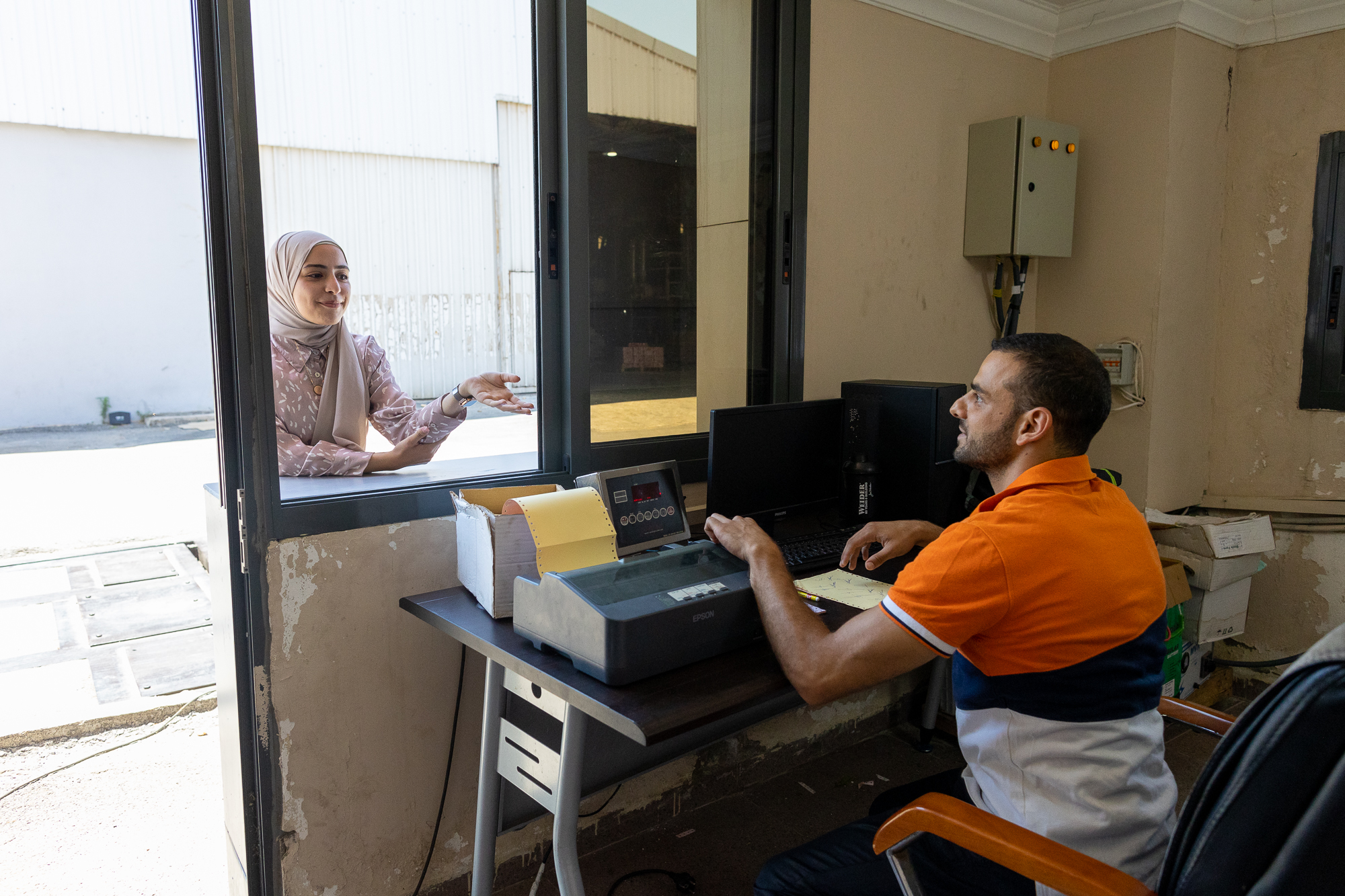
11. A woman writes a sentence on a board reading: “Used methods of education” during a Mental Health and Psychosocial Support session for Lebanese and Syrian mothers dealing with difficult behaviour in toddlers and young children, including temper tantrums, in Beirut. This is one of the PROSPECTS-funded activities UNHCR and UNICEF are carrying out in the country in cooperation with local implementing partners and communities.
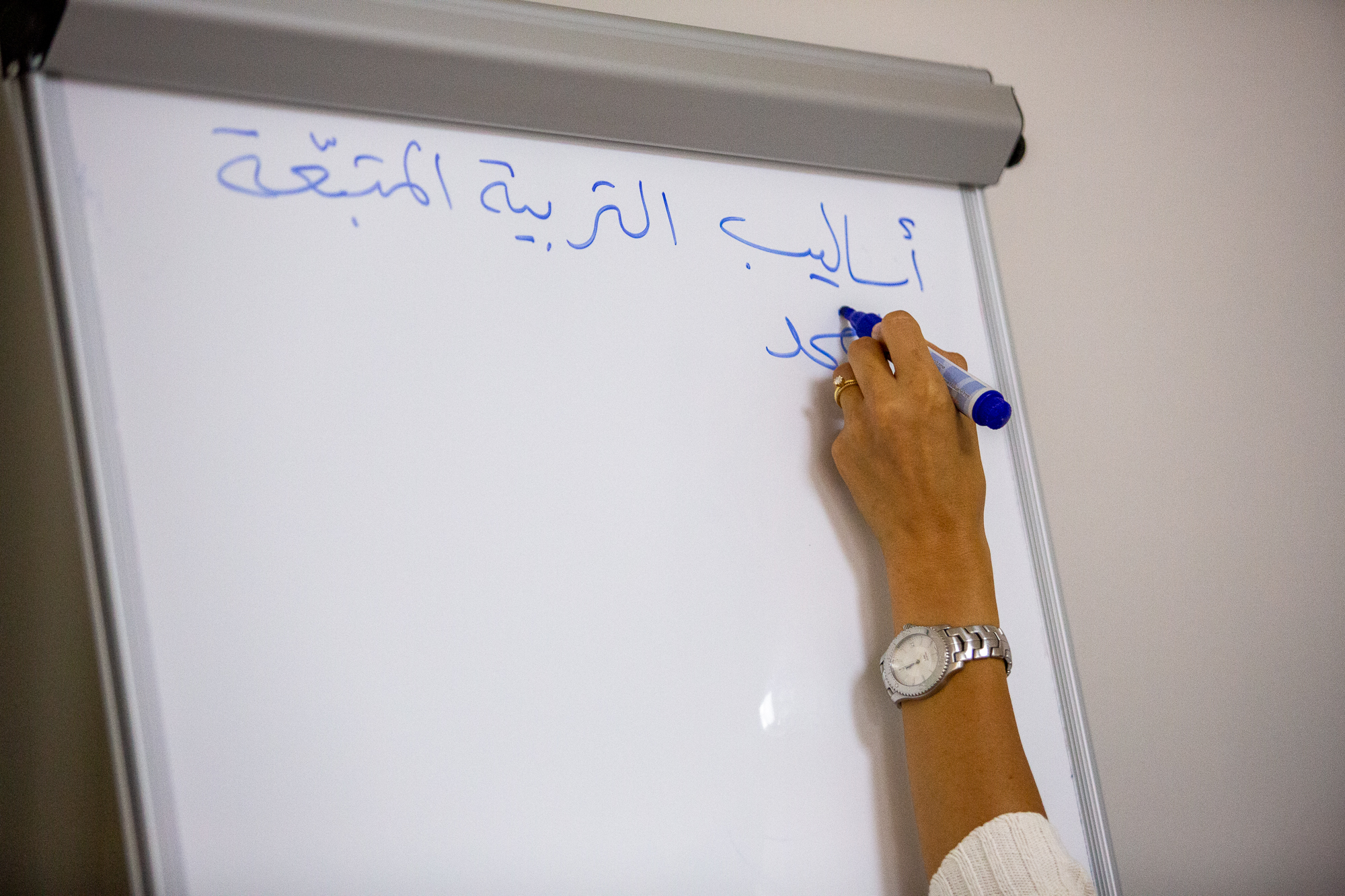
12. A Syrian mother attends a PROSPECTS-funded session for Lebanese and Syrian refugee mothers dealing with difficult behaviour in toddlers and young children, including temper tantrums, in Beirut. The joint UNHCR–UNICEF Mental Health and Psychosocial Support project has strengthened the collaboration between the two agencies in this field, particularly regarding the community-based Psychosocial Support component.
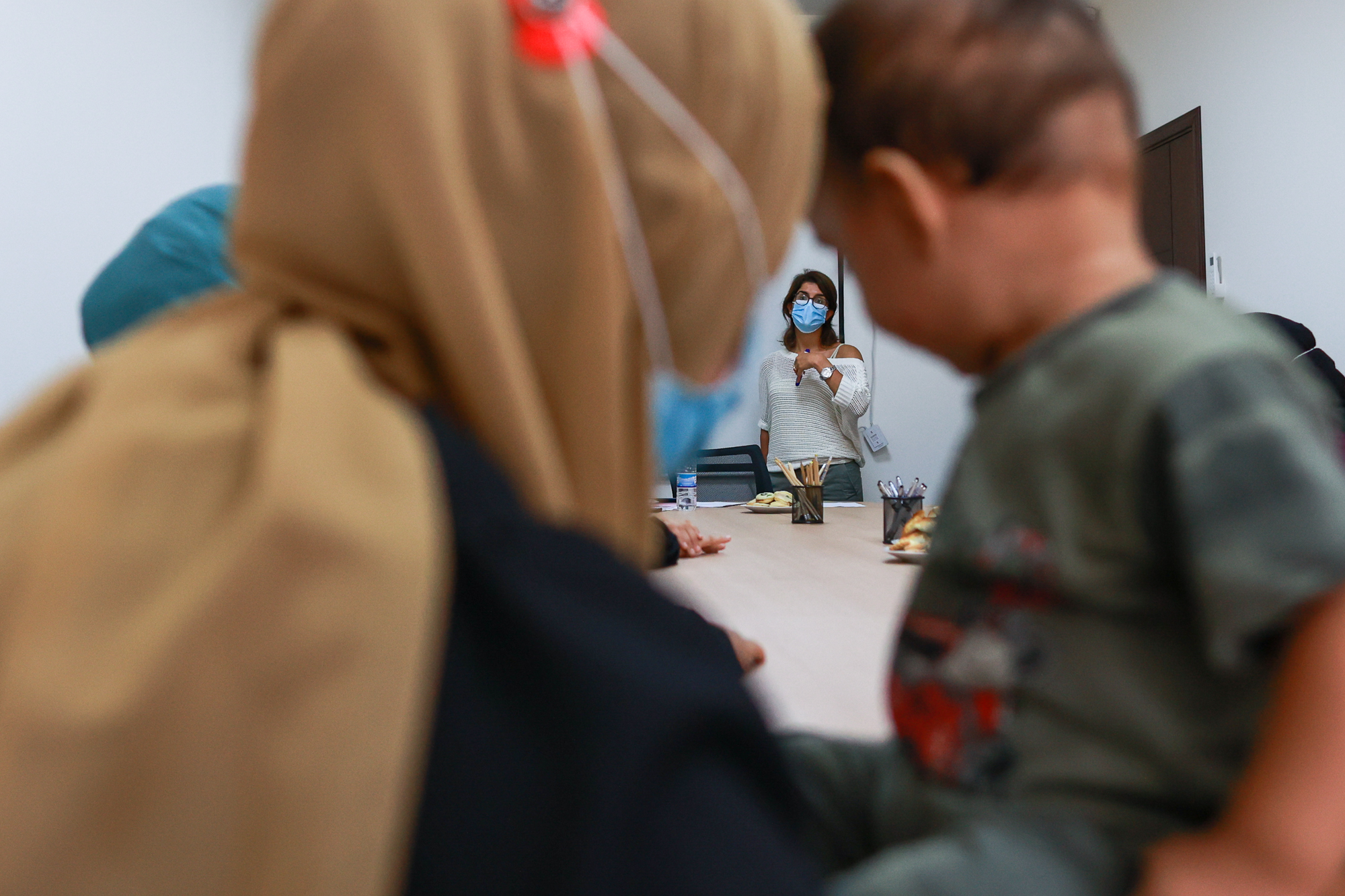
13. Women discuss family issues and ways to tackle them during a PROSPECTS-funded Mental Health and Psychosocial Support session for Lebanese and Syrian refugee women in Beirut. A detailed joint workplan between UNICEF, the UNHCR and other partners was developed over the years in consultation with the Government of Lebanon regarding the Mental Health and Psychosocial Support curriculum to be developed, among other project’s components.
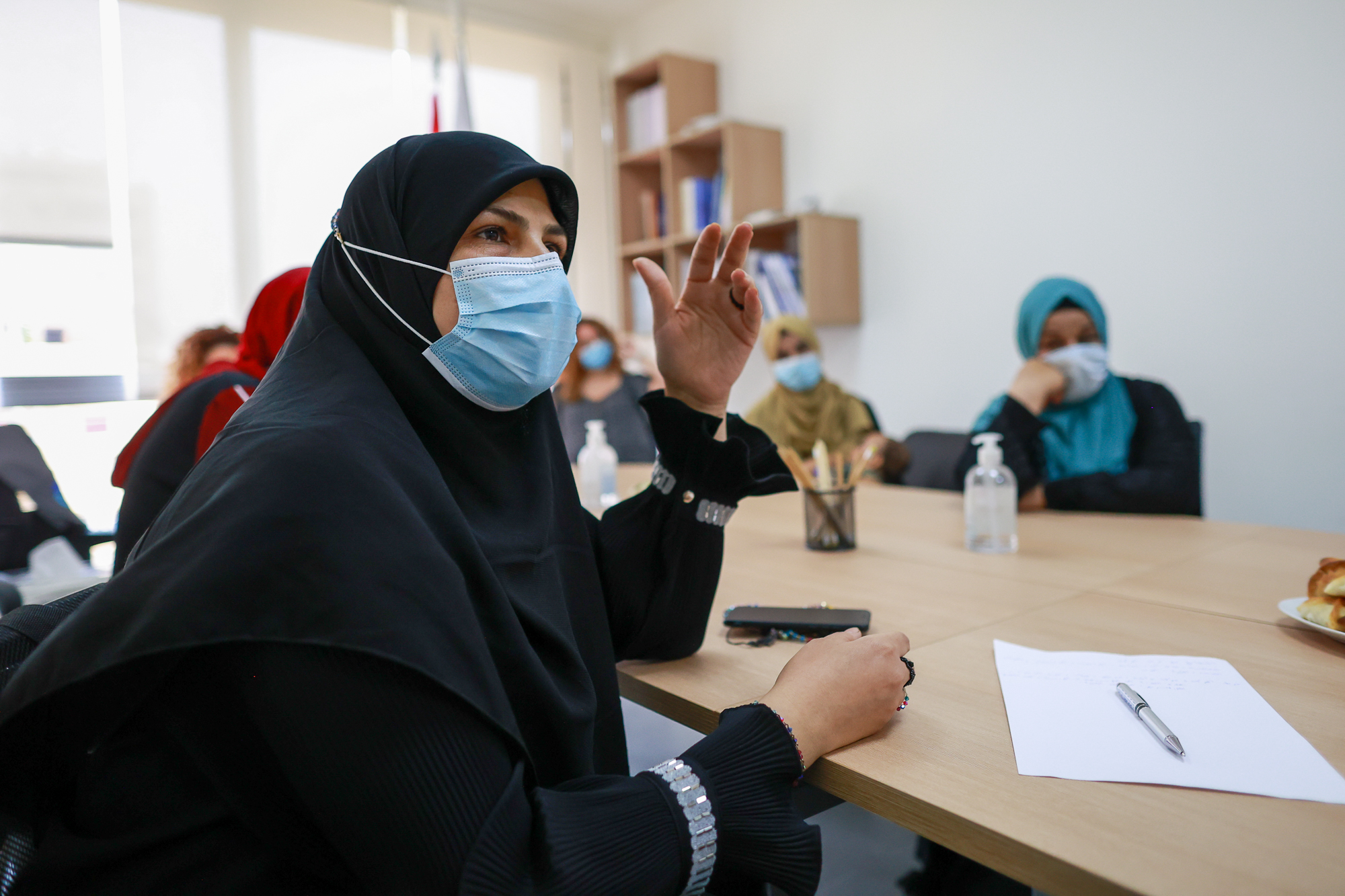
14. Vulnerable Lebanese and Syrian women take part in a Mental Health and Psychosocial Support session supported by the PROSPECTS partnership in Beirut. The UNHCR, UNICEF and their key implementing partners joined hands to meet the high needs of mental services in the country. In coordination with Lebanese authorities, they are set to scale up their Mental Health and Psychosocial Support programme in the next months to strengthen the capacity of community outreach volunteers and frontline staff to be able to provide quality psychosocial support to refugees and vulnerable Lebanese at the community level.
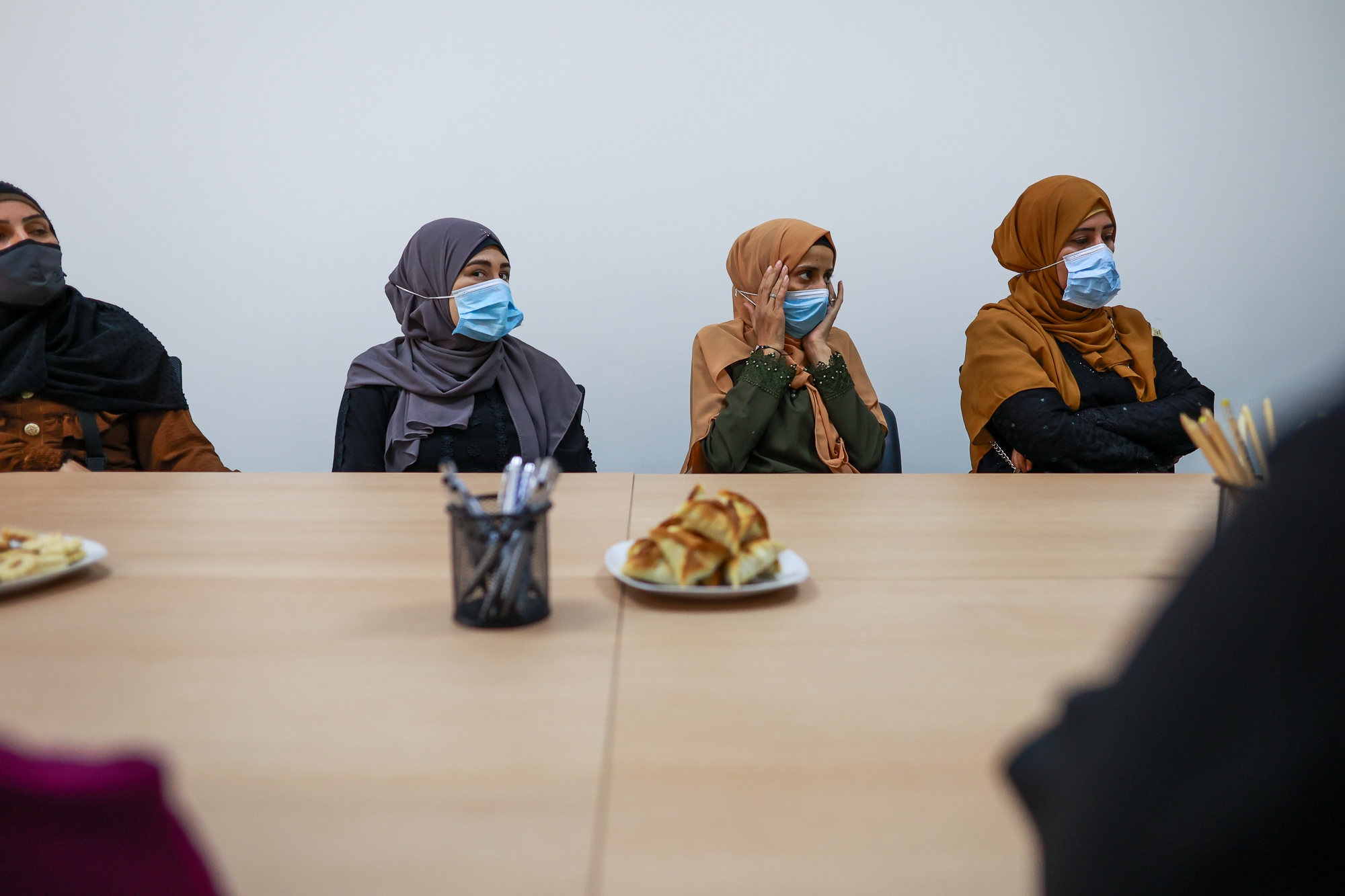
15. Syrian refugee Hisham Al Rawi, 38, from Hama sits in a centre for victims of torture and mental health support that the UNHCR and implementing partners run in Beirut. He fled Syria and relocated to Lebanon with his family in the beginning of his country’s conflict in 2012. He says he was victim of violence and abuse back home. Once in Lebanon, he started suffering from a severe form of depression and panic disorder. Al Rawi says he has been considering suicide on multiple occasions over the years. He says the medical and psychological support he received in the centre was key to get back to a new sort of “normal life.”
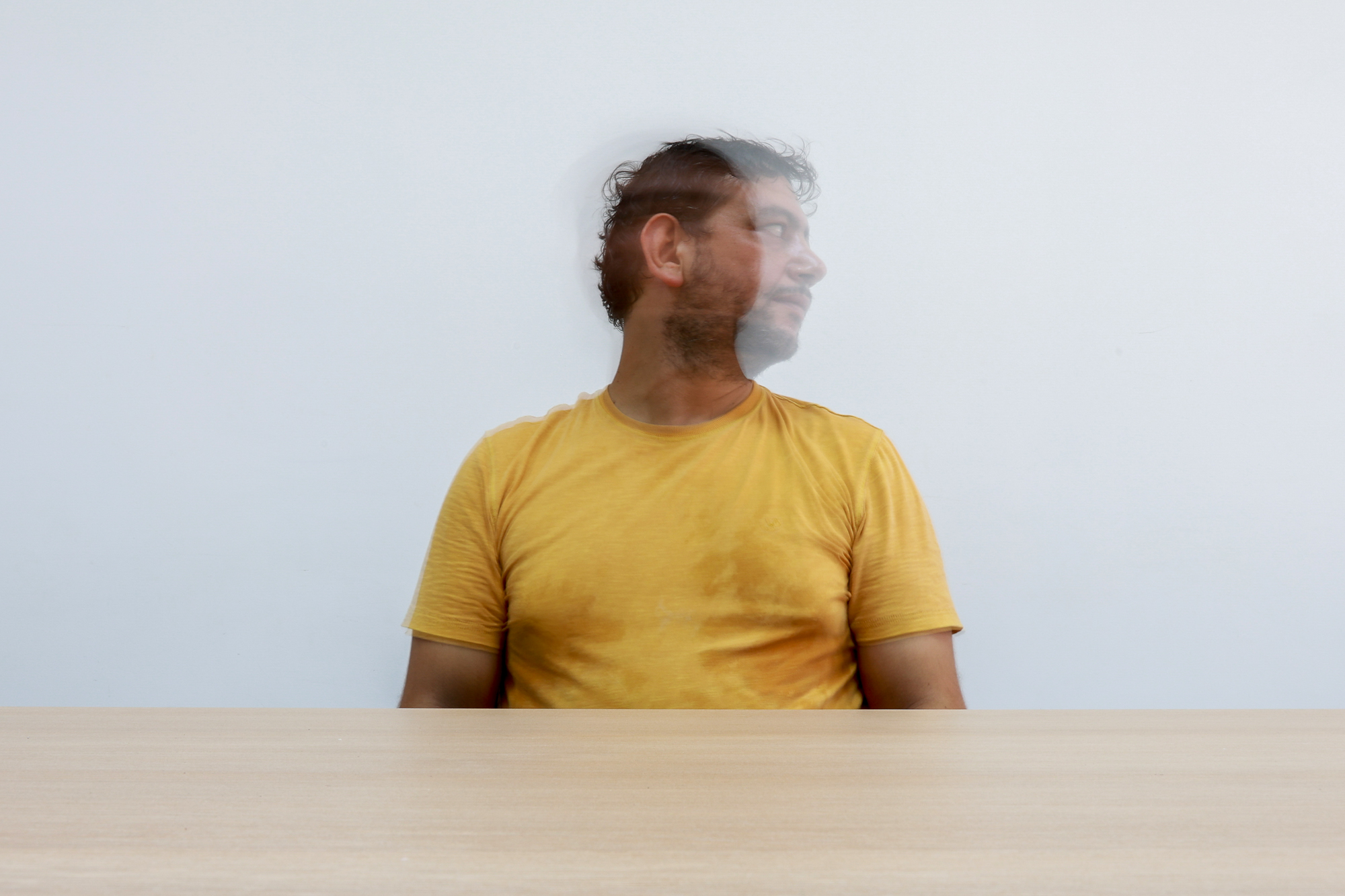
16. A Lebanese entrepreneur displays her products during the Youth Agri Market event in Beirut. Under the umbrella of the PROSPECTS partnership, UNICEF and the ILO exchanged lessons-learned and technical expertise on social entrepreneurship issues. This dialogue resulted into referral pathways established between dozens of youths receiving business start-up support from UNICEF’s GIL Innovation Labs and the business incubation support provided by ILO.
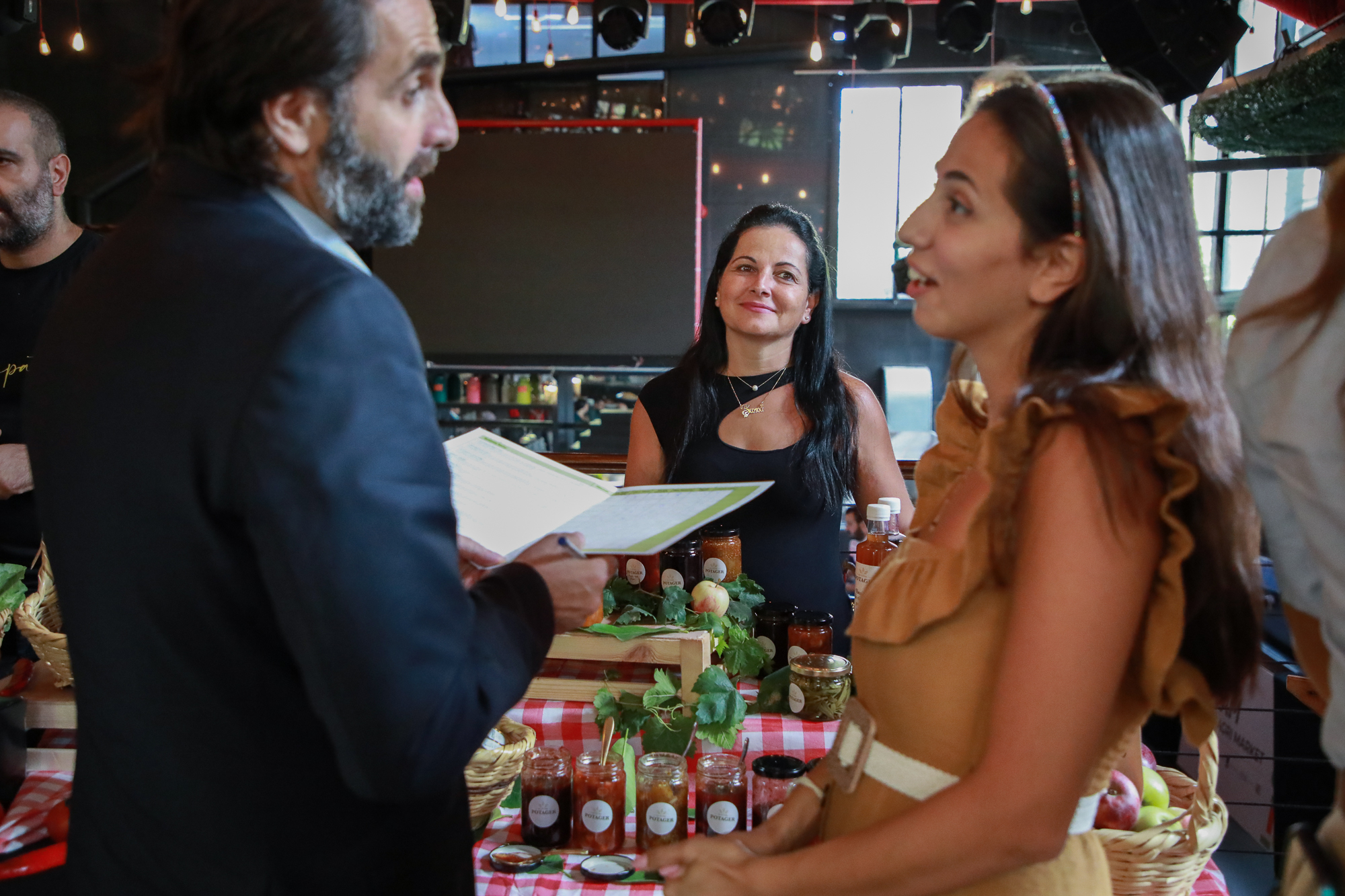
17. A Syrian entrepreneur sells goods he produces with his wife while holding his baby girl in the Youth Agri Market event in Lebanon’s Beqaa Valley. The ILO-UNICEF project offers joint workshops and exhibitions for their entrepreneurships programme graduates to share experiences and lessons learned and establish potential business-to-business linkages across the country. Young Lebanese and Syrian entrepreneurs had to pitch their projects and business plans to the agencies and their implementing partners, go through several rounds of scrutiny in order to get financial support and technical guidance to start their businesses.
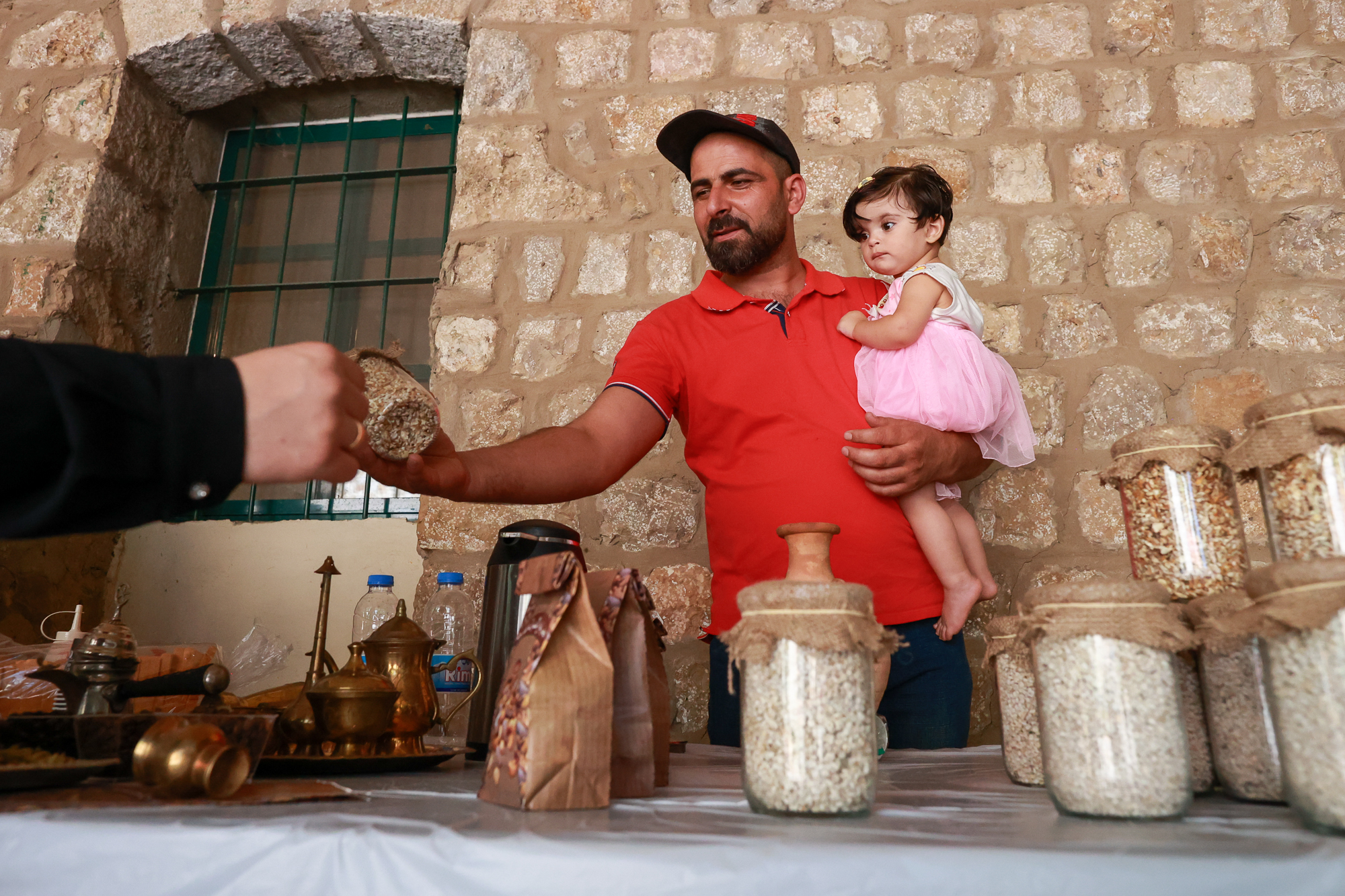
18. Lebanese and Syrian young entrepreneurs sell their products during the Youth Agri Market event in Lebanon’s Beqaa Valley. Under the PROSPECTS partnership, UNICEF conducted outreach to present and past youth beneficiaries involved in agriculture and referred them to ILO’s social entrepreneurship programme which focuses on agri-business start-ups. In many cases, these were youth who were struggling with their start-ups or required additional financial and technical support to expand their fledgling ventures.
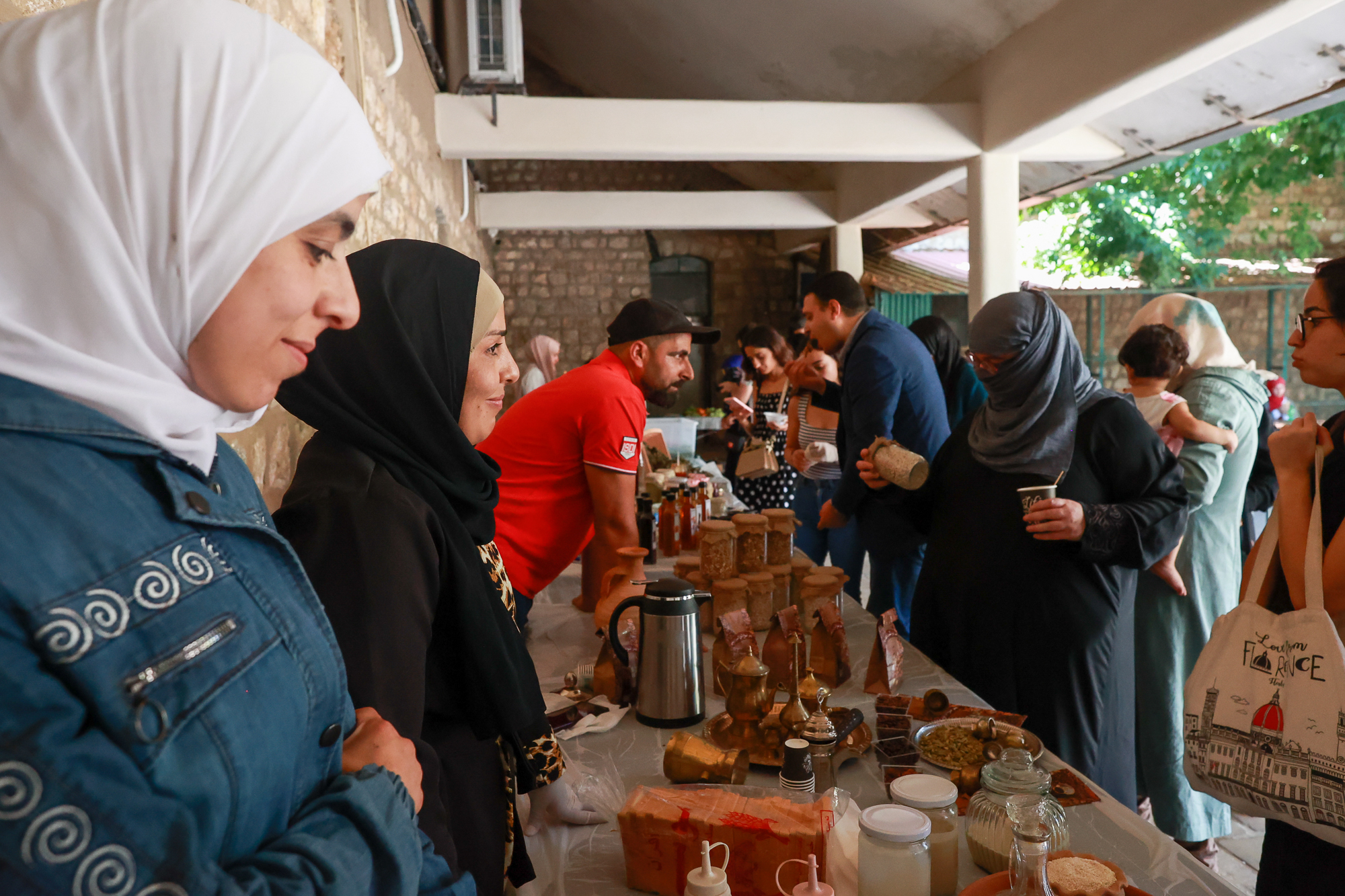
19. Products are seen on display during the second Youth Agri Market organized by the ILO, UNICEF and their implementing partners in Beirut. These include jams, vegetables, noodles, gluten-free cookies, tahini, coffee, aloe vera beauty products, organic eggs and hydroponic barley. Building on this initiative, the agencies might expand their referrals to the IFC StartMashreq program, which is moving in its implementation phase. IFC’s programme is designed to educate entrepreneurs and incubate businesses. The objective is to facilitate the creation of a pipeline of investable start-ups and support entrepreneurship and investments in Lebanon, with a particular focus on host communities including women and youth, and forcibly displaced people.
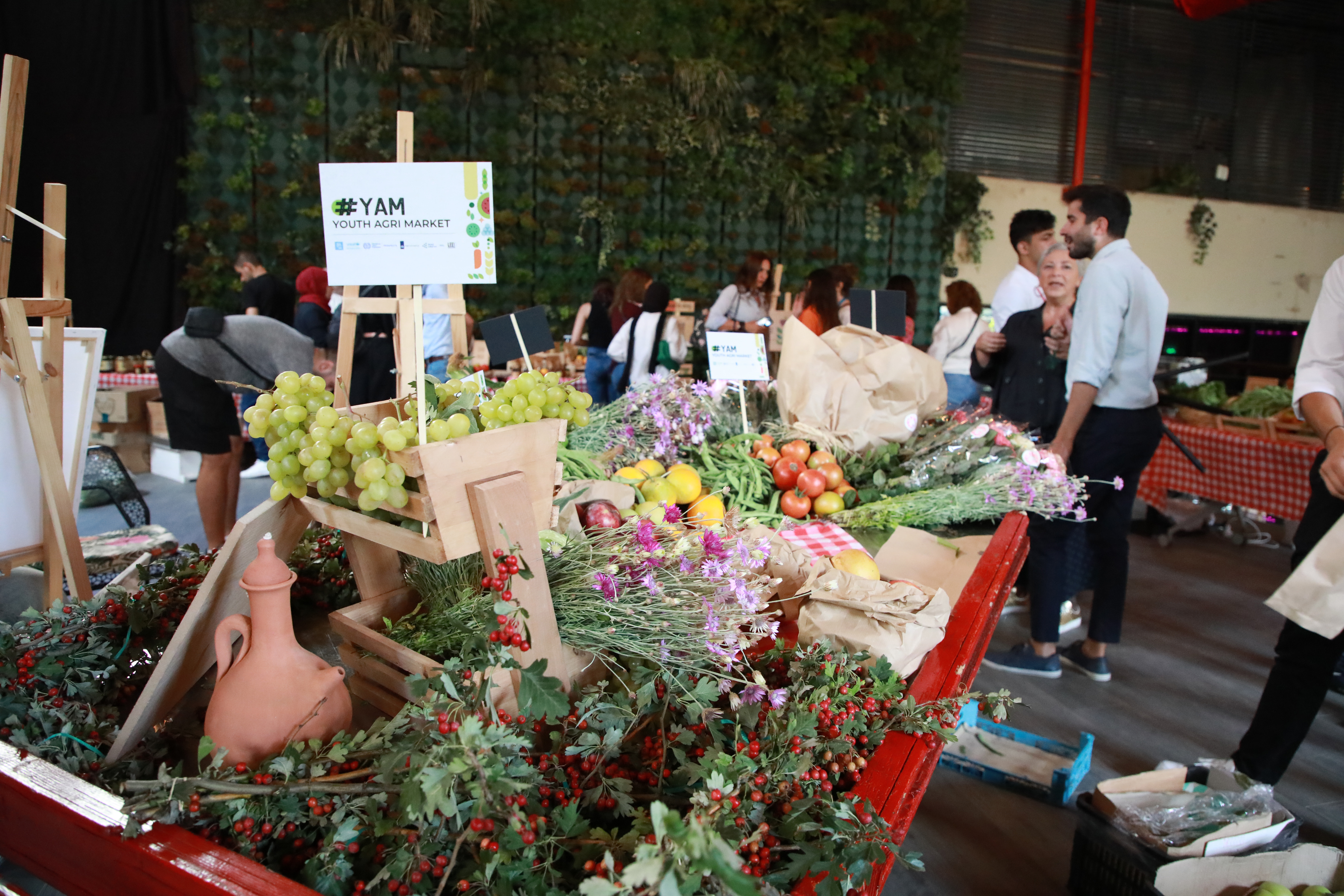
20. Around 250 participants attend the launch of the “Enhancing Youth Employment in the 21st Century Digital Economy” project in Beirut in September. The initiative is the result of a partnership between the World Bank and UNICEF under the Skilling-Up Lebanon Initiative. The project aims to improve the employability of youth from across Lebanon, equipping them with the digital skills needed to thrive in today’s continuously changing economy. Youth in the 17-35 age bracket will benefit from the establishment of an innovative electronic online and offline labour market platform meant to support their learning journey. Through the platform, they will be able to understand their needs and assess their skills, receive career guidance and employment services, attend high-quality market relevant trainings linked to industry certification, and be connected to employment opportunities in the digital, tech and creative world.
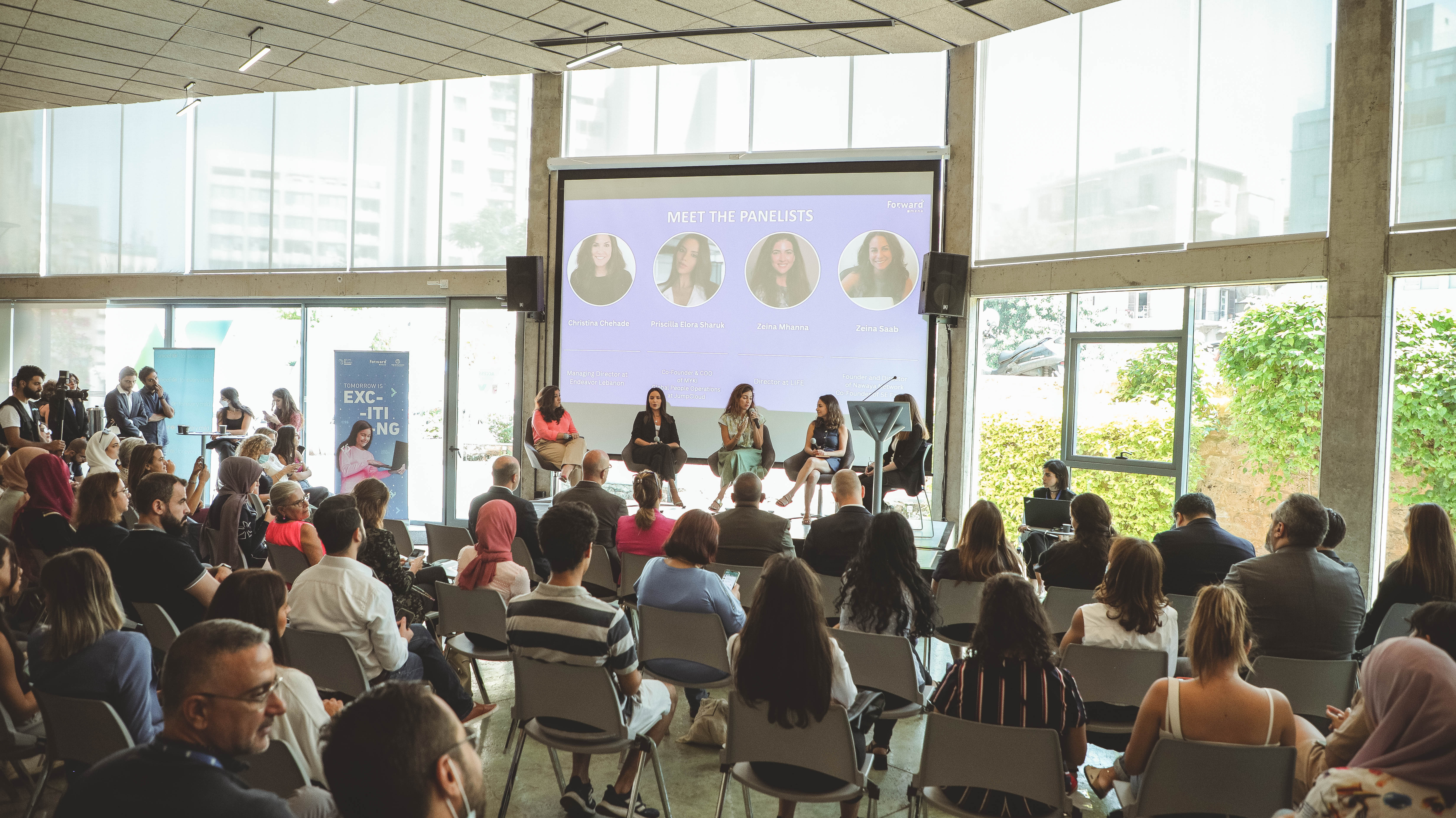
21. Syrian refugee and Lebanese children play on the street in Beirut. As part of the global joint UNHCR – UNICEF Child Protection project initiative and with the support of the Prospects partnership, UNHCR, UNICEF and their implementing partners started the revision of the national Child Protection Standard Operating Procedures in Lebanon. The project’s goal is to help transform the quality of life for refugee children and their communities by strengthening their inclusion in national child protection systems and ensuring their access to services. Under the Prospects umbrella, UNHCR is providing case management to over 5,000 children at risk, protecting them and their families, through the implementation of solutions in line with the children’s best interests. UNHCR trained around 350 staff members of child protection agencies and implementing partners so far.
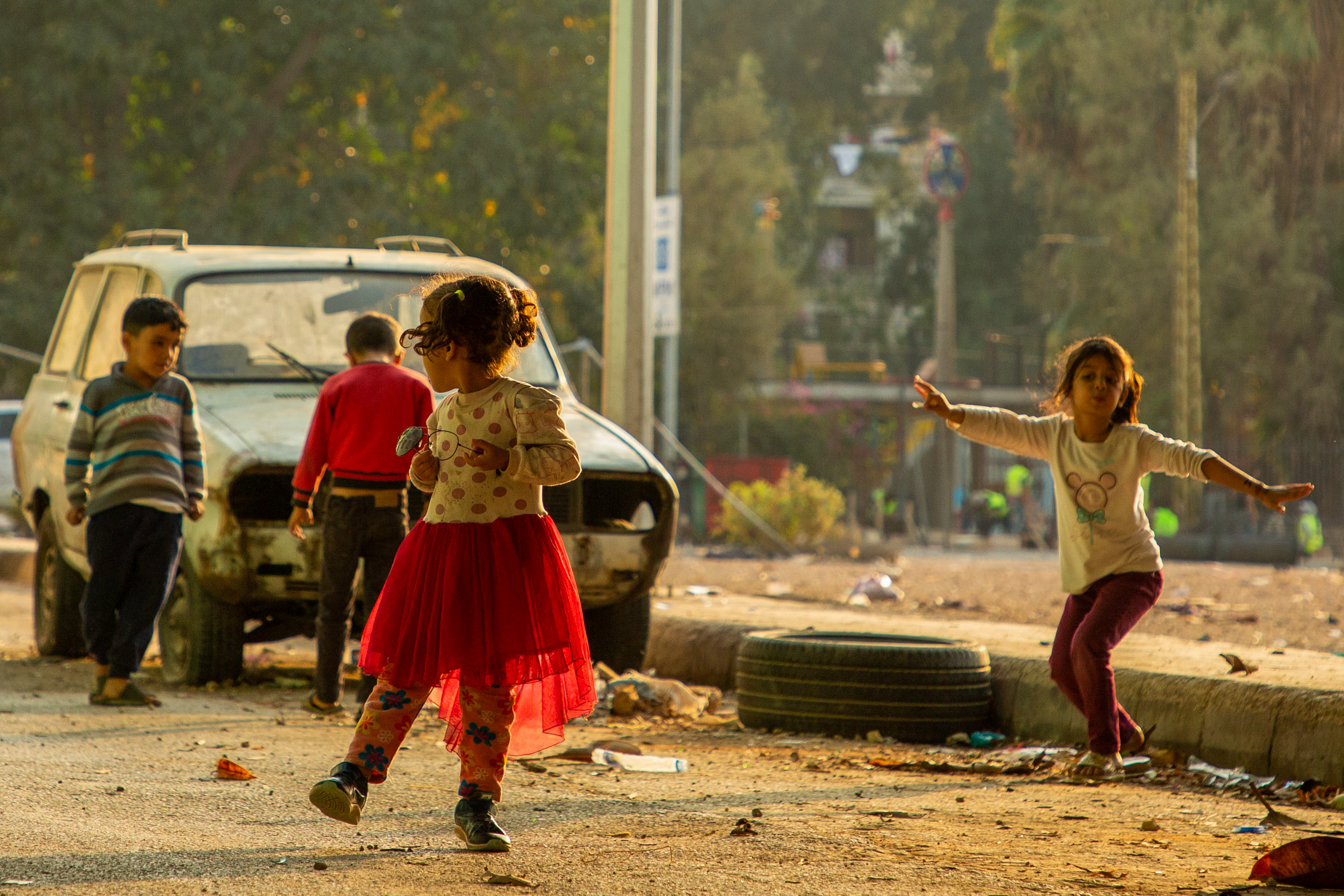
22. A vulnerable Syrian family is seen with one of their children in front of the house they share with other refugee families in Lebanon’s capital Beirut. The PROSPECTS partnership supported UNICEF to launch Lebanon’s first ever national-scale child grant programme in collaboration with the country’s Ministry of Social Affairs. The initiative, called ‘Haddi’ (Arabic for “next to me”), started in mid-2021 and reached 130,000 vulnerable Lebanese, Syrian and Palestinian children by the beginning of this year. The programme is providing cash assistance to extremely vulnerable families to allow them to cover for the increasing costs of raising children in Lebanon, going beyond basic needs such as food. The initiative has had a quick and positive impact on its beneficiaries so far, allowing families to spend more money on their children, leading to better diets, and even enabling parents to spend more time with their toddlers. The PROSPECTS funding was key to facilitate the collaboration between UNICEF and the ILO, to actively engage the country’s government, along with the World Bank, to eventually reach a consensus on the need to establish a National Child Grant programme in Lebanon.
